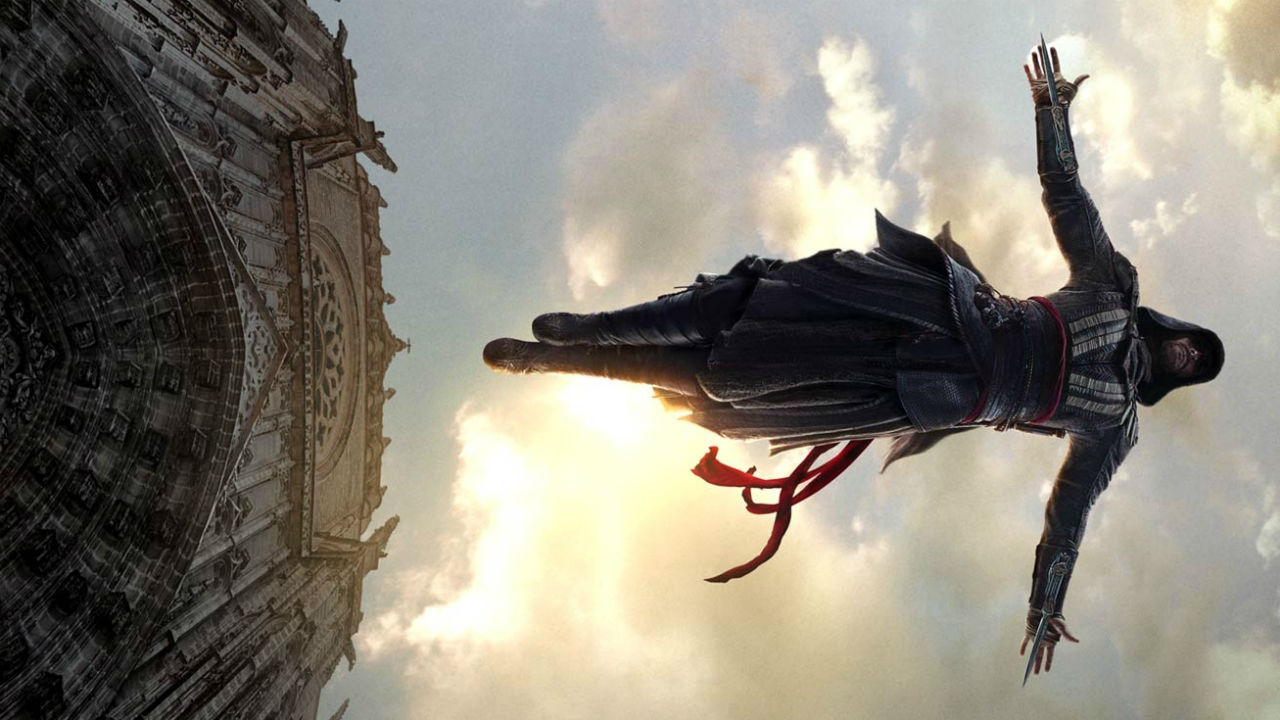The rise of video game-adapted movies is continuing its ever-laborious crawl toward genuine greatness. This year, we got Ratchet & Clank and Warcraft taking baby steps toward elevating the breakage of the so-called ‘video game movie curse’, two movies that were both savaged by critics and saw plenty of complaints from a fair degree of viewers, though were nonetheless well-produced, polished and clearly made with a lot of effort and passion. This led to both movies having a growing following of defenders, suggesting that public opinion is glacially shifting towards being more productive and accepting when it comes to adapting video games to the big screen.
Continuing that sluggish initiative of better video game-adapted movies is Assassin’s Creed, another video game-inspired movie that, surprise, was ripped apart by critics, and saw plenty of complaints from a fair degree of viewers. As with Ratchet & Clank and Warcraft earlier this year however, Assassin’s Creed definitely gets the style right, and is very well-produced, even boasting a surprisingly A-list lead cast to boot. In several respects, it stands alongside Warcraft as one of the most impressive video game-adapted movies to date, if still not anything truly standout.
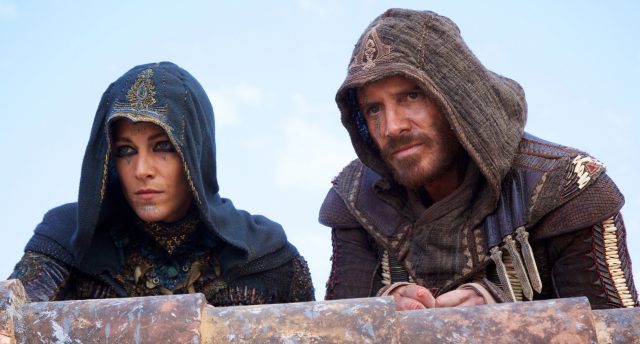
The destination is ahead of us, within sight to the more optimistic of moviegoers even, but despite that, this movie still has its own set of storytelling flaws and character issues that frustratingly drag it down. Assassin’s Creed is just the latest step on the uphill journey to making audiences at large start appreciating video game-adapted movies, rather than a truly good movie in its own right. If you’re a fan of the games that inspired the movie, then Assassin’s Creed will entertain you while it lasts, and you will at least feel like its source material was respected and revered throughout the movie’s final product, for better or for worse. The story frustrations might end up putting off general audiences beyond those actively championing the rise of video game-adapted movies, but if nothing else, Assassin’s Creed sure is gorgeous to look at, for what that’s worth.
Rather than revolving around a recognizable lead personality from the Assassin’s Creed video games, Assassin’s Creed instead stars an all-new character, Callum Lynch, a death row convict that is scuttled away from his supposed execution to be stashed at mysterious scientific firm, the Abstergo Foundation. Abstergo is after the memories encoded within the genetics of Callum (just go with it), which detail the exploits of his Spanish Inquisition-era ancestor, Aguilar de Nerha. Both Callum and Aguilar are portrayed by Michael Fassbender, with Callum literally assuming control of his Assassin ancestor to point Abstergo to the location of an artifact called the Apple of Eden, a key macguffin that is also present throughout the Assassin’s Creed games.
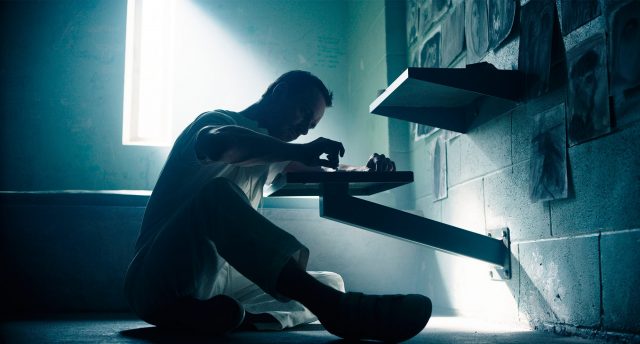
Fassbender is easily the best presence in the movie, being the one actor who leaps fully into their performance as both lead personalities. The movie spends much more time with Callum than it does with Aguilar, sometimes to a fault, since Aguilar is ultimately a lot more interesting than Callum, but Fassbender injects a decent amount of personality into a movie that is rather wanting for it. Even with the style of the games positively nailed here, the heart behind the franchise didn’t totally translate to the movie, which is trying so desperately hard to be taken seriously. Without Fassbender, Assassin’s Creed would have been a far bigger chore to sit through, since it, along with Warcraft, seems to represent the awkward adolescence of video game-adapted movie development, much like movies such as Hulk, Daredevil and Superman Returns represented the unfortunate byproduct of the same awkward adolescence from the comic book movie boom that began at the start of the 2000’s.
There’s no denying that Assassin’s Creed mostly wastes its prestigious lead cast though. Jeremy Irons is supposed to be playing our main present-day antagonist, Alan Rikkin, a character that actually is featured in the Assassin’s Creed games as well, though Irons is given so little to do beyond just standing there and looking menacing. It’s a big waste of Jeremy Irons, frankly, since he’s an actor that’s often so good at richly chewing scenery and dominating scenes with his charismatic villainy. Similarly, Marion Cotillard plays the morally ambiguous daughter of Rikkin, Sophia, the mastermind behind the genetic memory-extracting Animus machine in this movie version of Assassin’s Creed, but despite Cotillard’s immense acting talents, the role just doesn’t have any meat on it. It feels like Sophia is a blatant benchwarmer character for the movie sequels that Ubisoft, 20th Century Fox and New Regency are hoping to crank out from here, to the point where she’s left to either simply be a talking head of exposition, or do the same stale routine as her father.
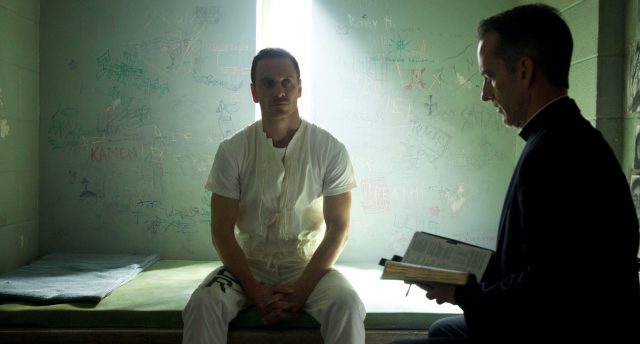
There are a few other characters placed in the movie, but none of them ever manage to register. Callum’s assassin father, played by Brendan Gleeson, is supposed to be important, but the movie never manages to effectively flesh out their strained connection to any relatable degree. Likewise, we see plenty of ass-kicking and flesh-stabbing in the past from Ariane Labed, who portrays Aguilar’s badass Assassin cohort, Maria, but Maria’s own lines and depth never become more than poetic musings. As well-produced as it is, the overwrought, convoluted lore behind the rather large Assassin’s Creed video game canon quickly leads to this movie adaptation collapsing under its own weight, and that means that there’s barely any development left over for the characters beyond Callum and Aguilar to try and snatch up. Instead, other characters beyond our leading man and his ancestor just seem to float in and out of every scene, not being unappealing, but not really effectively grabbing you either.
Despite the fact that video game-adapted movies are starting to nail a sense of production value and awesome, faithful style at last, they’re still pretty much universally struggling in the story department. Assassin’s Creed tends to fall into the same trap as Warcraft in this regard, namely that it actually tries too hard to be faithful to the insane amount of franchise lore from the source games, and as a result, the movie quickly becomes overstuffed and overwhelming, even if you’re fairly familiar with the intricate canon of the Assassin’s Creed games.
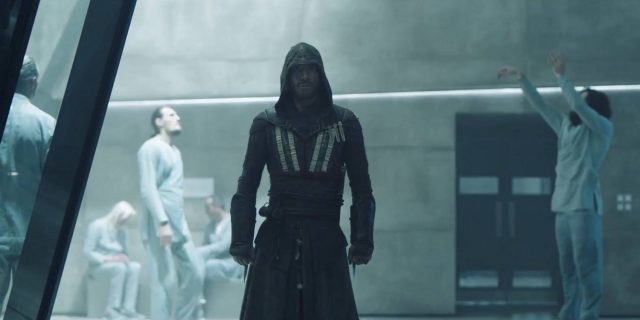
Also like Warcraft however, it’s tough to glean a simple, movie-friendly story from a video game franchise that’s supposed to be kind of complicated and ridiculous. It’s not impossible, but it is genuinely tough, and that’s one thing that many video games that lend themselves well to being movies haven’t quite figured out the recipe for yet. Assassin’s Creed at least unfolds reasonably coherently in its first two acts, granted, beyond throwing a lot of information at the beginning that may initially confuse viewers that are unfamiliar with the source games’ storylines. It’s in the third act that the storyline really starts to come apart, ultimately fracturing into a sloppy mess of confused ideas that seem more concerned with paving the way for a sequel than truly resolving and explaining anything.
In a strange way though, that makes Assassin’s Creed legitimately faithful to its source games. After all, the source games are frequently guilty of the same insane, incessantly sequel-baiting storytelling. Whether we should blame the movie adaptation for following the games to that degree is a bigger question, but there’s no question about it not being praiseworthy. Assassin’s Creed unfortunately missed a big opportunity with its plot when it came to a chance to streamline it and make it more accessible for a wider audience. The over-arching concept of Assassin’s Creed is fantastic as both a video game and a movie, but even the best Assassin’s Creed games have often been bogged down by huge layers of canon-bloating nonsense. It sucks that the Assassin’s Creed movie couldn’t ultimately escape that fate either.
Justin Kurzel directs Assassin’s Creed after also directing another Michael Fassbender/Marion Cotillard vehicle, that being last year’s recent film adaptation of Shakespeare’s Macbeth. Kurzel certainly isn’t a big name in directing, but he’s proven competent enough with his work on Macbeth, despite his lack of feature film experience. It also seems evident that Kurzel is a fan of the Assassin’s Creed games, since he goes to painstaking efforts to recreate various elements of the gameplay in the movie, from the movement and combat style of the Assassins, to the feel of the past and present environments that the movie is set within.

When Kurzel is allowed to revel in that recognizable video game inspiration, he does a standout directing job. The style and action of Assassin’s Creed is quite good, and its stunt work in particular is some of the coolest and most memorable of any movie released in 2016, even considering the story stumbles and over-emphasis on the less interesting present-day events. This is a big part of the reason why many viewers will wish that Assassin’s Creed spent more time on the past events, rather than treating them as an occasional interlude to the present-day slog that actually founds the story.
Unfortunately, where Kurzel falls short is often where it counts during those present-day events. Beyond Fassbender’s highlight lead performance, the rest of the performances and progression of Assassin’s Creed, at least those outside of its Spanish Inquisition-era scenes with Aguilar, feel disappointingly sterile and lifeless. It feels like Kurzel is just as bored with the present-day events as audiences inevitably will be, and sunk all of his directing flourishes into the past scenes, which act more like eccentric, yet very cool flashbacks than true story development. This makes it truly baffling that Assassin’s Creed forces audiences into so much joyless, plodding moments in the present, since it’s clear that the movie is best served when it’s revolving around Aguilar. I guess a self-contained Aguilar storyline wouldn’t lend itself as well to movie sequels like an ongoing present-day arc would, much like that of the early source games, but shouldn’t that indicate that the present-day events need to be just as entertaining?
Justin Kurzel’s younger brother, Jed Kurzel actually does the soundtrack of Assassin’s Creed, after also composing the soundtrack of Kurzel’s previous movie, Macbeth. The younger Kurzel does a fairly decent job with the score too. The music suite feels true to the flavour of the source games with its sweeping, awe-inspiring orchestral flourishes, though Kurzel also takes the opportunity to add some of his own touches, such as tense percussion that illustrates the bleeding between past and present surprisingly effectively. There’s a machine-like feel to the soundtrack that blends with the epic scope, and all in all, it’s a very fitting and engaging soundtrack that, again, will make you wish that Assassin’s Creed actually hung out in the Spanish Inquisition a lot more.
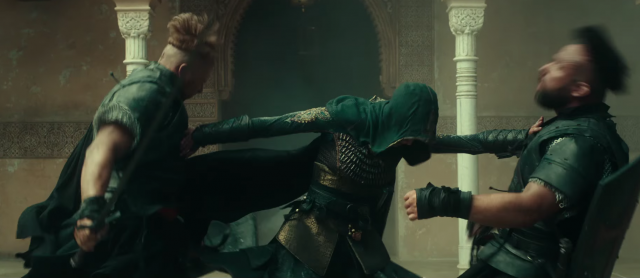
The rest of the audio work is generally very polished as well, with that same hefty, yet graceful sense of audio stylings between the Assassins and the Abstergo technology. In the past, the audio feels a lot lighter and almost free-floating in many scenes, with only the clash of blades occasionally injecting that needed dose of lethalness into Assassins that are otherwise very artistically appealing, and almost like performance artists. There’s a lot more weight to the audio in the present-day scenes by contrast, particularly as Callum’s psychology becomes adversely affected by his time in the Animus. Overall, there’s a lot of care and passion put into the audio work for both past and present in this movie, which is just as impressive as the audio suites of any of the Assassin’s Creed games, if not more.
By far the best part of Assassin’s Creed is its visual design, which is legitimately great, especially for a video game adaptation. That only exacerbates the frustration behind this movie’s character and story failings, but even when the plot will lose you and the supporting characters will fail to engage you, Assassin’s Creed is always a delight to watch. This is especially true if you’re a fan of the source games, with Assassin’s Creed capturing all of their beauty and badass style pretty much flawlessly. Everything from the action direction to the costume work to the Animus effects to whatever else in the visual department, is all very ambitious and true to the games, translating even the most insane ideas that Assassin’s Creed pulls from its source games to live-action incredibly well!
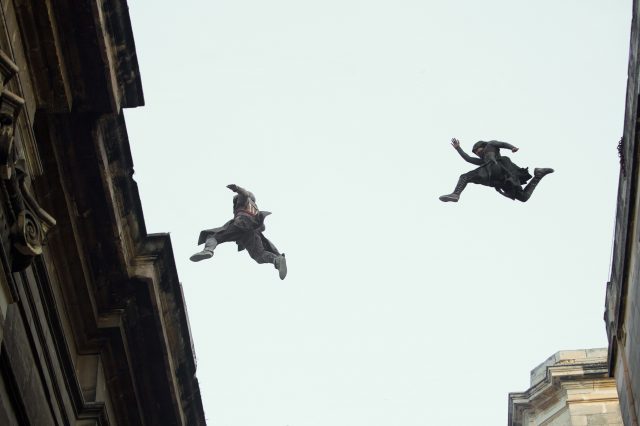
Even the otherwise sterile-looking present-day environments at Abstergo are visually appealing, which helps alleviate some of the story boredom they can often elicit. The few looks outside of Abstergo in the modern era also carry a grand, large-scale presentation that makes everything feel imposing and impressive, particularly when you actually get to poke around at the beautiful locations of the real-world Madrid, Spain. Assassin’s Creed was shot on location in Spain and Malta, and this was definitely worth it, as it leads to some truly breathtaking set work here. Once again, this is best displayed during the scenes set in the past, which bring the brutality and horror of the Spanish Inquisition to life pretty well, even if Assassin’s Creed ultimately tones down the violence of its source games a tad, and never truly ventures outside of its PG-13 rating, despite some really grisly kills here and there.
The only slight knock against the strong visuals in Assassin’s Creed is that the 3D presentation is pretty underwhelming, and that won’t even be an issue for those watching the movie flat in 2D, obviously. There’s a handful of decent 3D effects here and there, and some of the more sweeping shots in the past do use the 3D to boost the atmosphere a bit, though all in all, the 3D doesn’t ultimately add very much to the experience. If you’d rather just watch Assassin’s Creed in 2D, you’re really not missing much. It also feels like an undeniable missed opportunity to have not released Assassin’s Creed with an IMAX cut, since the wide-panning environmental scope of the past scenes especially would have really lent itself to an IMAX release. I guess there’s always next time, assuming Assassin’s Creed manages to get a big screen sequel anyway.
Assassin’s Creed has plenty of flaws, and it too often feels like a pretty sizable missed opportunity, considering the enormous potential of its source games’ concept for a movie adaptation. What we got with this first effort is pretty evidently disappointing, though I wouldn’t say it’s bad. As far as video game-adapted movies go most notably, Assassin’s Creed is once again one of the better ones, and like Ratchet & Clank and Warcraft before it, it represents video game-adapted movies getting gradually better. They’re getting better very slowly, but they are getting better. If this steady improvement keeps up, then video game-adapted movies could become seriously enjoyable mainstream blockbusters, akin to the modern rush of comic book-adapted movies at best, in several more years’ time.
For now, Assassin’s Creed represents the latest step on a hard journey to better movies from the video game space. That’s not exactly a hearty recommendation for general moviegoers, but for those who eagerly await the day when truly great video game-adapted blockbuster movies begin sweeping Hollywood, Assassin’s Creed nonetheless brings us a bit closer to that tantalizing future. Sure, it’s clumsily-plotted and severely lacking in personality, but it’s also well-presented, stylish and loaded with very cool action. It also strikes a mostly good balance between being faithful to the source games, without identically retreading them, even if this movie still falls victim to the same overwrought storytelling as many of the source games in the end.
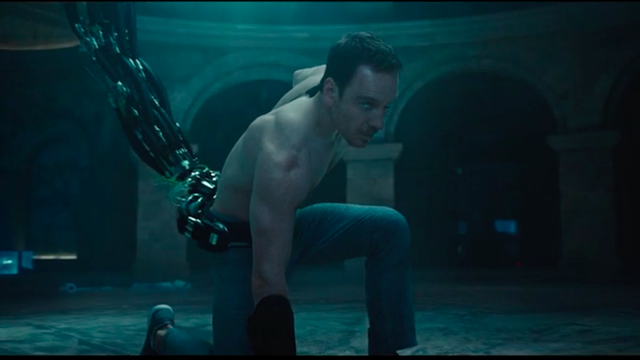
To be frank, if you have no stake in the rise of video game-adapted movies, and aren’t otherwise in the market for the slickly-shot action scenes, then Assassin’s Creed has disappointingly little to offer you. Fans of the source games will like it well enough, if they can forgive the overly dull present-day scenes that permeate so much of the movie, and fans of video games and genre media in general will have a decent amount of fun with Assassin’s Creed, even if it still hasn’t quite cracked the audience-friendly blockbuster recipe. You might be best served waiting for the chance to rent it on home video if you’re curious, but for what it’s worth, Assassin’s Creed is a competent video game adaptation, though far from the smash hit that the gaming medium needs to start better getting off the ground in the movie space.
I guess now it’s on to waiting for 2018’s Tomb Raider movie reboot for that potential next step to greatness for video game-adapted movies. Something tells me that next year’s Resident Evil: The Final Chapter isn’t going to be it.

